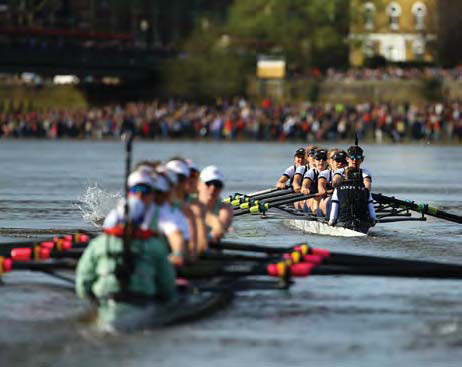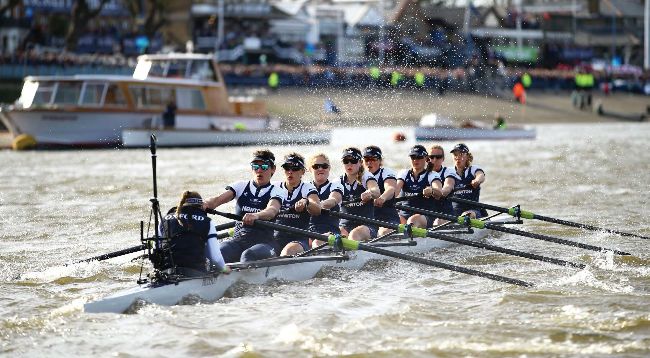Breaking New Ground
In conversation with Caryn Davies
WORDS: RACHEL HALLIBURTON
The Oxford alumna and two-time US Olympic gold medallist reflects on her 2015 Boat Race, the first women’s race to take place on the Tideway on the same day as the men’s race and over the same distance.
‘It can be like rowing in a washing machine’. Double gold and silver-winning Olympian Caryn Davies, who stroked the Oxford women’s team to victory in 2015, is describing what it’s like to row on the Tideway. The victory was historic, not least because it was the first year that the women’s race had taken place on the Tideway. ‘Another way you might describe it is like riding one of those mechanical bucking broncos,’ she continues. ‘My advice would be don’t fight it. If you tense up it’s only going to make it worse for you.’

Davies had arrived to study law in Oxford in January 2013, shortly after it had been announced that the women’s team would row the race on the Tideway. ‘It was a lucky confluence of events,’ she declares when we talk on WhatsApp. ‘Oxford had hired Christine Wilson who had coached me on the US National Team in 2003. I went and did some rowing with the team but didn’t race because I wasn’t eligible in 2013. But I knew I wanted to come back in 2015 and row for Oxford as part of the historic event. So I started to look at programmes, especially the MBA.’
At the point when Davies was sat on the start line for the Boat Race, she was America’s most decorated oarswoman. Since then, she points out in an email exchange when we’re setting up the interview, her Olympic teammate Elle Logan has overtaken her by winning a third Olympic gold. Though, since Logan has never taken part in the Boat Race, Davies remains its highest profile participant.
She recalls, “I’d never done a start like this before. Even before it begins you’ve got to be aware of the water underneath you. Because of the strength of the flow at the time we raced, we had to get ready with our blades flat on the water. You’re sitting there thinking, ‘Don’t stuff up’. Then, when the umpire says ‘Attention, go!’, you have to square your blade, put it in the water and pull all in one go. Lots of crews stuff it up. Once you’ve got past that it’s basically an all-out sprint to the turn; you want to get there first so you get the better line. So you’re not thinking about the fact this is a 7km race, you’re thinking about the first 2km. Once we got to the turn and knew we were well ahead, we pretty much knew that as long as we didn’t mess up, we would win it.
“After we crossed the line I was exhausted, and felt like my teeth were falling out. I’m told that’s normal when you’ve pushed yourself to make the maximum effort.”
“After we crossed the line, I was exhausted. I felt like my teeth were falling out! I’m told that’s normal when you’ve pushed yourself to make the maximum effort. I was poking at my teeth to make sure they were all right. There were all kinds of sensations. But it was really satisfying having rowed that hard.”
Is she surprised it took the women’s race so long to get to the Tideway? ‘Honestly, no. There are two sides to the Boat Race coin,” she says. “One of the things I loved at Oxford was the tradition. But when you have hundreds of years of tradition, by definition that means things are slow to change. It’s very different from the US where we have a federal law called Title IX [passed in 1972]. This law says that federally funded institutions, like universities, must afford men and women equal opportunities. In university athletics that translated to women being on a fast-track to equality. Lots of women’s sports programmes were even better funded than the men’s because a big proportion of the men’s funding went to football.”

This year, of course, none of the teams will be racing on the Tideway. What would Davies - who herself was stopped from competing this year when the Tokyo Olympics was postponed due to the pandemic - say to rowers, especially young women, who must have felt devastated when March’s race was cancelled? “It’s difficult to know what to say, because I’ve been lucky,” she replies. “Even if Tokyo is cancelled outright, I’ve already taken part in three Olympics. So I won’t have lost much. I feel bad for the women who lost their only chance to compete. But the fact is that if you were expecting an experience like that to “change” you or allow you to say you’ve “made it”, you need to realise that life doesn’t change that significantly. People sometimes say to me, ‘If I had an Olympic gold medal, I would never have a bad day.’ Sorry, it doesn’t work that way. You’re still the same person with fears and insecurities and, yes, bad days. You still have to figure out how to be a good citizen, a good partner, a good parent. There’s always something to aim for, always something to work on.”
Has she herself ever experienced prejudice as a rower? “Nothing serious,” she replies. “When I was in high school I rowed the single. I had beaten the other high school women in the country so I put in a special request to row in the men’s race. I was told I couldn’t do that. Would you call that prejudice? I ended up going in the women’s race and won.” She also laughingly remembers a moment at the Henley Royal Regatta “when we were sitting in the boat waiting for the race to start. There was a minor delay while the umpires chased some geese off the course. The spectators were standing about ten or fifteen metres away, and when I looked round a man shouted, ‘What’s the matter sweetie, have you broken a nail?’”
It’s telling to consider how embarrassing this story is for the man in the light of her subsequent success not just as an Olympian but as a lawyer specialising in corporate transactional work. For Davies the focus is firmly forward, “Ideally, I’ll be able to go to Tokyo, even if it’s completely different from any other Games. After that, the aim is to practise full-time as a lawyer - I’ve already got a job lined up.”
Rowing is never going to stop being a key part of her life though. “For some of my team-mates, once they’ve competed in the Olympics, they give away all their unisuits and say they’ll never row again,” she relates. “I don’t really understand that. In Boston, where I live, I’m a member of several rowing clubs. I’ve always known I’ll keep doing this sport for the rest of my life.”